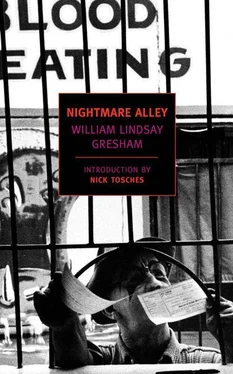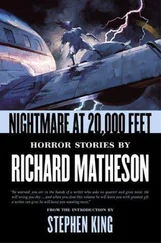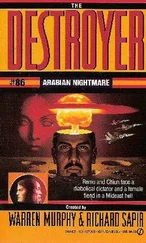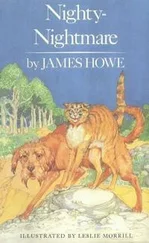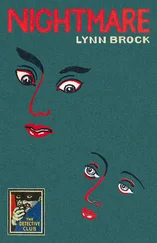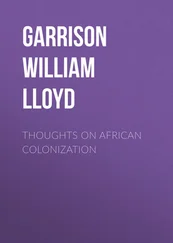Stan followed the south side of the park and turned up Main Street. Myers’ Toy and Novelty Mart had taken in the shop next to it and expanded. In the window were construction kits for airplanes with rubber-band motors. Mechanical tractors. A playsuit of what looked like long red underwear, with a toy rocket-pistol. A new generation of toys.
Leffert’s Kandy Kitchen was closed but the taffy still lay golden in metal trays in the window with almonds pressed in it to form flower-petal designs. Christmas was the time for Leffert’s taffy, not autumn. Except the autumn when they had beaten Childers Prep; he had taken a bag of it to the game.
The wind whirled down the street, making store signs creak above him. The autumns were colder than they used to be, but the snow of winter wasn’t as deep.
On the edge of town Stan looked out across rolling country. A farmhouse had stood on the ridge once. Must have burned down or been pulled down. Dark against the sky Mills’ Woods lay over the rise, too far to walk; and what was the use of going through all that again. She was probably dead by now. It didn’t matter. And the old man was dying.
Stan wondered if he could get a bus out of town before the night train left. Or he might load up with magazines and go to the hotel and read. It was well past noon but there was a lot of the day left.
Then a side street led him down familiar ways; here and there a lot stood empty, with a gaping cellar where a house had been.
He didn’t realize he had walked so far when the sight of the school brought him up short. In a country of square, brick boxes some long-dead genius on a school board had made them build this high school differently: gray stone with casement windows, like a prep school or an English college. The lawn was still green, the ivy over the archway scarlet with the old year.
It was a cool June evening and Stan wore a blue coat with white pants; a white carnation in his lapel. Sitting on the platform he watched the audience while the speaker droned on. His father was out there, about ten rows back. And alone. Couples everywhere else, only his father, it seemed, was alone.
“… and to Stanton Carlisle, the Edwin Booth Memorial medal for excellence in dramatic reading.”
He was before them now but applause didn’t register; he couldn’t hear it. The excitement under his ribs was pleasant. The power of the eyes upon him lifted him out of the black emptiness in which he had been sunk all evening. Then, as he turned, he suddenly heard the applause and saw his father, beaming, smashing his palms together, shooting quick looks left and right, enjoying the applause of the others.
“Taxi!” Stan saw the old limousine lumbering toward him and flagged it. The driver was Abe Younghusband, who didn’t recognize him until he gave the address.
“Oh, say, you must be Charlie Carlisle’s boy, ain’t you? Ain’t seen you around for some time.”
“Sixteen-nearly seventeen years.”
“That a fact? Well, guess there’s lots of improvements since you left. Say, I heard you’re a preacher now. That ain’t true, is it?”
“Sort of half and half. More of a lecturer.”
They turned off the car tracks, down the familiar street with the maples scarlet in the rays of the afternoon sun.
“I always figured you’d go on the stage. I still remember that show you put on at the Odd Fellows’ Hall, time you borrowed Chief Donegan’s watch and made believe you was smashing the hell out of it. His face was sure something to see. But I guess you got kind of tired of that stuff after a while. My boy’s a great one on tricks. Always sending away for stuff. Well, here we are. I hear Charlie’s pretty shaky these days. I hear he’s turned worse during the last week.”
The house looked tiny and run to seed. A wooden staircase had been built up one side of it, and a door cut into the attic floor. The yard was scuffed, with bare patches; the maples that used to shelter the house had been cut down. Where Gyp’s kennel had stood there was still a rectangle in the ground. The earth forgets slowly.
The woman who answered the door was white-haired and stout, the lines about her mouth petulant. It was Clara Carpenter; but what a tub she had turned into!
“How do you do. Mrs. Carpenter?”
“Mrs. Carlisle . Oh.” Her face lost some of its caution. “You must be Stan Carlisle. Come right in. Your dad’s been asking me a dozen times an hour when you were coming.” She lowered her voice. “He’s not a bit well, and I can’t make him stay in bed. Maybe you can persuade him to take it easy, a little. It’s his heart, you know.” She called upstairs, “Charlie, somebody to see you.” To Stan she said, “I guess you know your way upstairs. The big bedroom. I’ll be up directly.”
The stairs, the newel post, the two ridiculous spouted urns on the mantelpiece, seen through the double doors. The metal fireplace covering. The wallpaper was different, and the upper hall looked different some way, but he didn’t stop to find out why.
The old man was seated in a chair by the window, with a knitted afghan over his knees; seamed face, scrawny neck. His eyes looked frightened and sullen.
“Stanton?” Charlie Carlisle moved with difficulty, hands gripping the chair arms. “Stanton, come over here and let me take a good look. Gosh, you-you don’t look so very different, son. Only you’ve filled out a lot. You’re-you’re looking all right, son.”
Stan tried to throw his shoulders back. But a weight was pressing them, a deadly weight that made his knees tremble. The life seemed to be leaking out of him, flowing into the carpet under his feet. He took a chair on the other side of the window and leaned back in it, drawing his breath, trying to fight off the crushing weariness.
“I didn’t know you’d married Clara,” Stan said at last, getting a cigarette out and lighting it. He offered one to his father, who shook his head.
“Doctor’s got me cut down to one cigar a day. Yes, I kept bachelor’s hall for quite a spell after you left. I-I always figured I’d hear from you, boy, and then I’d tell you. Clara’s a fine girl. Ever hear from your mother?”
The words had a hard time coming out, his lips were so tired. “No. Never did.”
“I’m not surprised. Guess she didn’t find us exciting enough. What do they call it now-glamour? That’s what Cynthia wanted. Glamour. Well, if she found it I don’t reckon she’s got much of it now.” The mouth came down in creases of bitterness. “But tell me what you been doing, Stan. I said to Clara, sure he’ll come. I said, we had our differences, and I guess he’s been busy, making his own way. I said, I know he’ll come if I tell him I’m in bad shape. Feel a lot better today, though. I told the doctor I’d be back at the office in a month. Feel a lot better. What’s this I hear you’re a minister of the gospel, Stan? Clara heard you on the radio one day, she said. That’s how we knew where to send that telegram.”
The Rev. Carlisle uncrossed his legs and knocked the ashes from his cigarette into a jardiniere holding a fern. “I’m more of a lecturer. But I do have a Minister’s certificate.”
The elder Carlisle’s face brightened. “Son, I’m gladder to hear that from you, and believe it, than any other news I’ve heard in a month of Sundays. You work your way through seminary? Why, son, I wanted you to go. I was willing to lay out cold cash to pay your way. You know that. Only you couldn’t see it at the time. Always fooling with that magic nonsense. I’m glad you finally got that out of your system. It was your mother put those ideas in your head, Stan, buying you that box of tricks. I haven’t forgotten it. But I don’t even know your denomination.”
The Rev. Carlisle closed his eyes. His voice sounded flat and toneless in his own ears. “It’s not a big or a rich church, Dad. The United Spiritual League. It’s devoted to preaching the gospel that the soul survives earthly death, and that those of us who still are earth-bound can receive intelligence-from those who have passed over to the higher spheres.”
Читать дальше
